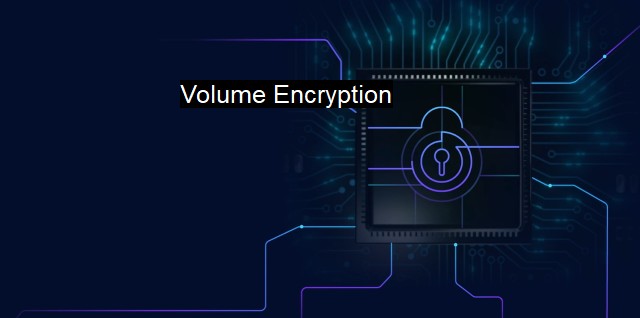What is Volume Encryption?
The Importance of Volume Encryption in Protecting Sensitive Data: Safeguarding Against Cybersecurity Threats on Devices and Networks.
Volume encryption, situated in the context of cybersecurity and antivirus strategies, is a robust protective measure aimed at securing datasets. This requires an understanding of the fundamentals of this concept and its relative demarcation points concerning cybersecurity as well as antivirus mechanisms.Volume encryption is a comprehensive method that encrypts a whole data storage system, whether it's a hard drive or any detachable media storage. It involves encoding information with an encryption algorithm so that only a designated authority with the correct decryption key can decode (access) it. volume encryption is a data-at-rest encryption method that safeguards data in the event of unauthorized physical access to a device.
Considering the delicate nature of digital information in this era of pernicious cyber threats, there's an increased demand for robust system security measures. In business and personal technology environments, volume encryption remains a preferred strategy to secure sensitive data from unauthorized or malicious access.
From a cybersecurity standpoint, volume encryption is mathematical artistry in securing data. While cybersecurity measures include application security, network security, operational security, and disaster recovery amongst others, volume encryption is particular about data security. Its purpose is to deny unauthorized users access by scrambling, relocating, or even changing the dataset scheme.
When successful, intrusion attempts typically result in useless and inaccurate data without the correct key/algorithm as the data may appear as random figures or characters to non-authorized persons. This protects proprietary and private information from malicious attacks or data theft. Hence, sensitive information, irrespective of the device location, is well secured, deterring potential intruders and lessening the threats posed by viruses and malware.
Let us delve a bit into how this relates to antivirus mechanisms. Antivirus programs are configured to guard against known and unknown malicious attacks using several protocols including real-time scanning, behavioral data analysis, heiuristics, sandbox, etc. Yet, having such protocols does not bulletproof the integrity of data and information on a system mainly because antivirus software are primarily prevention-response in their operation.
On the other hand, considering volume encryption alongside antivirus measures gives data protection an additional security wrapper. A system running volume-encypted sensitive data paired with adept antivirus software unarguably affirms a heightened level of data security assurance. This is achieved as the encrypted data stored on a volume is immune to manipulation in the event of malicious intrusion or cyberattack. Thus, even in the event of the onset of undetected malware-attacks, which sometimes may not immediately activate the functionalities of antivirus software, the overall integrity of the storage system is uncompromised until the antivirus software responds to the detected threat.
Volume encryption, besides enhancing cybersecurity, ensures data security by adding a 'redundant security measure’ to protect stored data, even in varied states of unauthorized physical access, compromise, relocation or transition. The value in adopting this technology as a staple in a comprehensive cybersecurity strategy cannot be understated and it will remain a welcomed development in the cyberspace community. The intersection of volume encryption with other antivirus protocols will undoubtedly highlight new frontiers in securing data in an ever-dynamic digital landscape faced with escalating threats.

Volume Encryption FAQs
What is volume encryption and why is it important in cybersecurity?
Volume encryption is the process of encrypting an entire hard drive or storage device so that the data on it cannot be accessed without the encryption key. It is important in cybersecurity because it provides an extra layer of protection against unauthorized access to sensitive information. In the event that a device is lost, stolen, or hacked, the data on it will be unreadable without the encryption key.How does volume encryption work?
Volume encryption works by using an encryption algorithm to convert the data on a storage device into unreadable code. This code can only be decrypted with the encryption key, which is typically a passphrase or a combination of keys. When a user accesses the data on the encrypted device, they must provide the encryption key, which is then used to decrypt the data on the fly.What are some of the best volume encryption tools available?
There are several volume encryption tools available, and the best ones will depend on your specific needs and preferences. Some popular options include BitLocker (Windows), FileVault (macOS), and VeraCrypt (cross-platform). It is important to choose a tool that is well-reviewed, regularly updated, and compatible with your operating system.Can antivirus software detect malware on an encrypted volume?
Antivirus software can detect malware on an encrypted volume, but it may not be able to remove it without the encryption key. If malware is found on an encrypted device, it is recommended to disconnect the device from the network, back up any important data, and then either wipe the device or contact a cybersecurity professional for assistance. It is also important to patch any vulnerabilities that may have allowed the malware to infect the device in the first place.| | A | | | B | | | C | | | D | | | E | | | F | | | G | | | H | | | I | | | J | | | K | | | L | | | M | |
| | N | | | O | | | P | | | Q | | | R | | | S | | | T | | | U | | | V | | | W | | | X | | | Y | | | Z | |
| | 1 | | | 2 | | | 3 | | | 4 | | | 7 | | | 8 | | |||||||